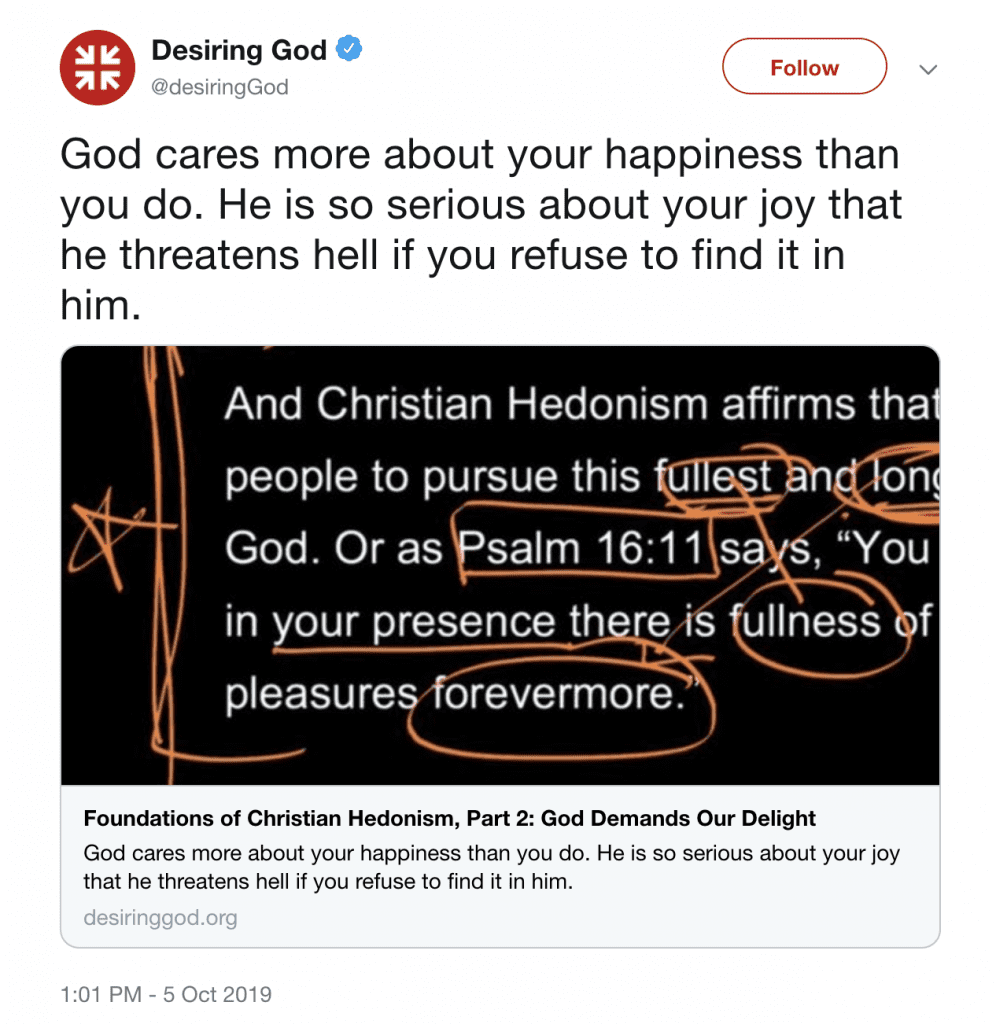A post on facebook pointed me to a tweet by Desiring God, John Piper’s ministry, alleging that the tweet describes an abusive relationship. They’re not wrong.

Text of tweet: God cares more about your happiness than you do. He is so serious about your joy that he threatens hell if you refuse to find it in him.
Well this is delightful.
The Friendly Atheist’s takeaway was that Christians Need Better Publicists for Their Love-or-Torture Theology. Amusingly, many of those responding to Piper’s tweet (likely actually posted by whoever he has running his ministry’s social media) initially assumed the account was an atheist account parodying Christianity, only to realize the tweet was serious.
Several people wondered whether the OP had read the tweet aloud before posting it. Someone thought this tweet made sense, while virtually everyone reading it—including Christians—held their heads in horror. Including Christians? Yes, look:
Text of tweet: Hey there! Look, I get the point you’re trying to make– but only b/c of study & prayer: God gave us free will to choose. His desire’s for us to choose Him. He never threatens. To say He threatens hell just reinforces secular pov of God as God of punishment not grace.
This gets at the heart of the Christian apologia surrounding hell. Growing up in an evangelical home, I was taught that God does not want anyone to go to hell. So far so good. But then why did he create it? Why not just not create hell in the first place? One response I was given is that hell is a sort of natural result of God’s goodness—that a good god necessitates somewhere for evil to go. In other words, God didn’t set out to create hell. It just sort of … happened.
It’s worth bearing in mind that the doctrine of hell has been the subject of heated debate among Christian theologians for as long as Christian theologians have existed. There are many opinions and views, not just one. I was also given to understand, growing up, that God can’t stop people from going to hell, if they refuse to turn to him—his goodness and purity is such that he can’t let sin or depravity into heaven. It’s some sort of immutable law that binds even God.
This is the sort of thing that translates better into a world created N. K. Jemisin (the greatest science fiction author of all time, second only to Ursula Le Guin) than it does into the world narrated by evangelicals, with its all-powerful all-knowing God.
In Jemisin’s The Hundred Thousand Kingdoms, Itempas, the god of order, and Nahadoth, the god of chaos, were both born out of the Maelstrom. Each had their own nature, and their natures shaped and affected the world created by their sister, Enefa, goddess of balance, and of life and death. None of the Three could help or change their nature.
But evangelicals’ God is all-powerful and all-knowing. It is more difficult to argue that this God cannot help the existence of hell—or at least foresee it, and forgo creating humans until finding a solution that won’t lead to billions of them being tortured for eternity. (Not all Christians believe in a hell that involves conscious eternal torment, but evangelicals generally do.)
Piper’s tweet—or at least, his ministry’s tweet—dispenses with much of this debate, arguing instead that yes, God does “threaten hell” when people refuse to turn to him. It isn’t just a natural consequence God weeps over but can’t change. It’s something God uses as a threat to get people to love him, and find their joy in him, and not in the world he created.
That’s a very different argument from the claim that God can’t help the existence of hell due to his nature.
I have a Patreon! Please support my writing!















